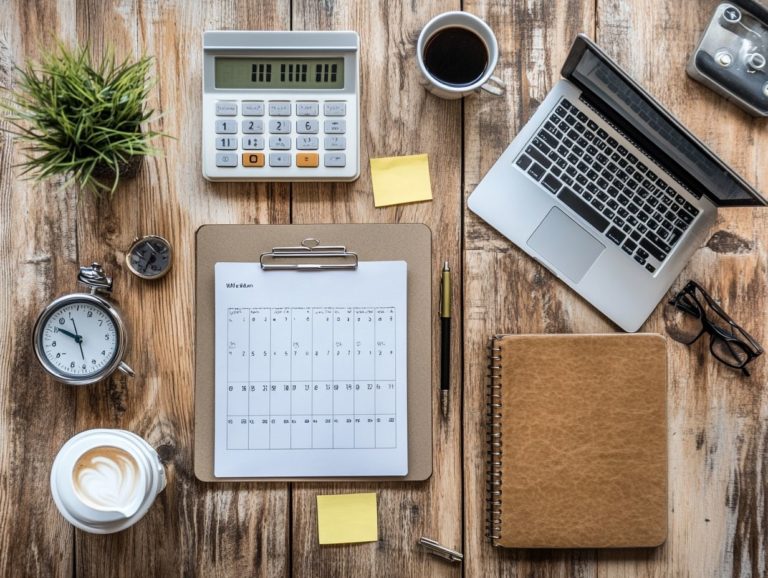The Role of Gratitude in Fighting Procrastination
Procrastination can often feel like an insurmountable hurdle, leaving you stressed and overwhelmed. Recent insights suggest that practicing gratitude might just hold the key to overcoming this common challenge.
This article delves into the intriguing connection between gratitude and procrastination, revealing how cultivating a mindset of appreciation can significantly reduce stress, boost motivation, and inspire action.
You ll find practical tips for seamlessly integrating gratitude into your daily life, along with insights on how it can enhance other strategies to effectively combat procrastination.
Join us on this exciting journey to transform your habits and mindset, paving the way for a more productive life.
Contents
Key Takeaways:

- Gratitude can break the cycle of procrastination by shifting our mindset and boosting motivation.
- Practicing gratitude daily can reduce stress and increase productivity, helping us overcome procrastination.
- Incorporating gratitude into our daily lives through practical tips and exercises can aid in changing our habits and improving our overall approach to tasks.
The Relationship Between Procrastination and Gratitude
The relationship between procrastination and gratitude presents a fascinating interaction that significantly impacts your mental health, emotional well-being, and productivity. Procrastination often arises from bad habits such as task avoidance and ineffective time management. You can counteract these tendencies by practicing gratitude.
Research shows that nurturing gratitude can enhance your psychological flexibility, or the ability to adapt your thinking, and promote self-reflection. This, in turn, gives you the power to confront the triggers of procrastination and engage more effectively with your tasks. By grasping this connection, you can uncover effective strategies to break the cycle of procrastination, including the role of meditation and integrating gratitude and mindfulness practices into your daily routine.
Understanding the Connection
Understanding the connection between procrastination and gratitude unveils how your emotional responses to tasks can lead to anxiety and hinder your mood management.
When faced with daunting tasks, you might find yourself engulfed by a wave of negative emotions that trigger avoidance behaviors, ultimately spiraling into procrastination. Weaving gratitude into your daily practices helps to reframe these emotional experiences, transforming feelings of dread into opportunities for growth.
Regularly reflecting on what you appreciate can help cultivate a positive mindset, reducing anxiety and boosting your motivation. Incorporating techniques such as deep breathing exercises and mindfulness practices can further empower you to manage your emotions effectively. This approach fosters resilience and encourages a more proactive stance toward challenges, allowing you to navigate them with confidence.
Benefits of Practicing Gratitude
Practicing gratitude presents a wealth of benefits that can profoundly enhance your emotional well-being, assist in managing stress, and encourage a healthier lifestyle.
Research has consistently shown that embracing gratitude can improve mental health, spur personal growth, and elevate motivation levels, empowering you to conquer procrastination and break free from negative habits.
When you engage in gratitude practices, you begin to focus on the positive aspects of your life, fostering a more constructive emotional response to your tasks and interactions.
Furthermore, weaving gratitude into your daily routine can pave the way for long-term personal development and bolster your emotional resilience.
Reducing Stress and Boosting Motivation

Reducing stress and boosting motivation are compelling benefits of practicing gratitude. It is a highly effective strategy for alleviating anxiety.
When you incorporate gratitude into your daily routine, you may find yourself feeling lighter and more focused. This transformative mindset can break the cycle of procrastination, leading to heightened productivity and a profound sense of fulfillment.
Engaging in simple practices, like keeping a gratitude journal or taking a moment each day to reflect on positive experiences, can profoundly shift your perspective. By actively recognizing what you appreciate, you tap into intrinsic motivation, the drive that comes from within you, not from external rewards.
Understanding the differences between intrinsic and extrinsic motivation further underscores how gratitude practices not only cultivate resilience but also inspire proactive behavior. This approach ultimately paves the way for more consistent progress in your daily tasks.
How Gratitude Can Help with Procrastination
Gratitude can help you overcome procrastination. By boosting emotional awareness and mental flexibility, it empowers you to tackle responsibilities with renewed vigor and focus, as highlighted in the article on understanding the benefits of gratitude in reducing procrastination.
Changing Mindsets and Habits
Changing your mindset and habits is entirely achievable through the integration of gratitude and mindfulness practices. These are powerful tools for breaking negative habit loops.
By nurturing a deeper awareness of the present moment and fostering appreciation for both the small and significant aspects of life, you can cultivate a more positive outlook. This transformation promotes self-reflection and paves the way for adopting healthier lifestyle behaviors.
Practicing gratitude helps you uncover intrinsic motivations, which can effectively combat procrastination tendencies. Understanding the role of self-discipline in combating procrastination can further enhance your efforts. To successfully implement these practices, start setting aside dedicated time each day to jot down what you’re grateful for.
This simple exercise can rewire your thought patterns, encouraging a more proactive mindset. With this newfound focus, you can take actionable steps that reinforce beneficial habits, as recognizing what you value inspires you to invest more in your well-being.
Incorporating Gratitude into Daily Life
Incorporating gratitude into your daily life can be both transformative and straightforward. Start embracing practices like daily journaling and mindfulness techniques that foster a deeper sense of appreciation and enhance your emotional regulation.
These simple actions can change your life for the better!
Practical Tips and Exercises

Practical tips and exercises for enhancing gratitude include a variety of gratitude practices that elevate emotional awareness and task prioritization.
One of the most effective methods is gratitude journaling. Each day, take a few moments to jot down things you appreciate. This simple act fosters positive emotions and clarity, uplifting your mood while helping you pinpoint what truly matters.
With this clarity, you can better prioritize your tasks. Another engaging approach is creating a gratitude jar. Write down moments of thankfulness on slips of paper and place them in the jar.
Over time, you’ll visually accumulate positivity, serving as a delightful reminder of the good in your life. These practices not only combat procrastination but also cultivate a proactive mindset, significantly enhancing your overall productivity.
Combining Gratitude with Other Strategies
By integrating gratitude with various behavioral strategies, you can significantly enhance your ability to overcome procrastination, as discussed in the role of self-compassion in overcoming procrastination and effectively break the cycle. This powerful combination fosters a positive mindset and empowers you to take decisive action.
Maximizing Effectiveness in Overcoming Procrastination
To overcome procrastination, first, understand what triggers it. You need to build your mental adaptability.
Identify specific situations or emotions that lead to task avoidance. For instance, you might procrastinate when feeling overwhelmed or anxious. Emotional regulation techniques like deep breathing and mindfulness can help you manage these feelings, fostering a more engaged mindset.
Practicing gratitude can shift your focus from dread to appreciation, making task completion feel rewarding. Pairing gratitude with small, achievable goals empowers you to take meaningful steps forward, effectively combating procrastination. Additionally, understanding the role of tenacity in overcoming procrastination can further enhance your motivation.
Frequently Asked Questions
What is the role of gratitude in fighting procrastination?

Gratitude helps us shift our mindset from negative to positive, making tasks seem more manageable and enjoyable.
How does being grateful help combat procrastination?
Focusing on what we are grateful for reduces negative thoughts and feelings that often lead to procrastination.
Can expressing gratitude improve our productivity?
Yes, expressing gratitude reduces stress and increases motivation. It helps us concentrate on the present, preventing feelings of being overwhelmed by future tasks.
How can gratitude be incorporated into our daily routine to fight procrastination?
Incorporate gratitude by starting each day with 3-5 things you are thankful for. This sets a positive tone and keeps you motivated to tackle tasks.
Why is gratitude important in breaking the cycle of procrastination?
Gratitude breaks the procrastination cycle by shifting focus from what we lack to what we have accomplished, providing satisfaction and motivation to move forward. Incorporating the role of routine in fighting procrastination can further enhance this process.
Can gratitude help us overcome the fear of failure that often leads to procrastination?
Yes, expressing gratitude reminds us of our strengths and accomplishments. It allows us to approach tasks positively, making them less daunting.






